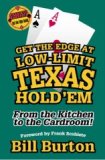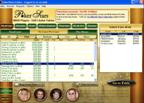
Get the Edge at Low Limit Texas Hold'em
Position in Poker
What is probably the most overlooked concept involved in playing winning Texas Hold’em is your position at the table during a hand.
There is an adage that says, "The Key to success in Business
In my book, I wrote that to be successful playing Texas Hold’em you need to learn the three P’s: Position, Power and Patience. Position is the first P because the strength of your hand (Power) is dependant upon your position to the dealer button.
A starting hand that you would throw away in early position may very well be a hand you would raise with in late position or if you are on the button.
Your position is determined by where you are sitting in relationship to the dealer's button. Unlike seven card stud, where the betting order changes with each betting round, the order is fixed in Texas Hold'em.
Before the flop, the person to the left of the big blind bets first. After the flop, the first active player to the left of the dealer button acts first.
If you are in early position, you will remain there for all betting rounds. (Even though the blinds make their decision last before the flop, the have actually acted first by posting the blind bets.)
There are seven positions in a ten handed Hold’em game.
Small Blind – Player posting small blind
Big Blind – Player Posting Big Blind
Under the Gun (UTG) - Player who acts first after the big blind
Middle – The two players after Early.
Late – The tow players after Middle
Button- The player with the dealer button.
When you are in early position, you have a distinct disadvantage because you have no idea what the players acting after you will do.
It is possible that the pot could be raised and re-raised after you enter the hand. For this reason, you need to have a much stronger hand if you want to play from early position. Before you call the blind with a hand from early position, you should ask yourself if you would play that hand if you knew the pot would be raised. If you would not call a raise with that hand then you should not play.
In poker, knowledge is power. The more information you have, the better chance you have of accessing your opponent’s hands. The later you act in the round the more information you have.
When you are in late position you have already seen what the players before you have done. If there has been a raise and or re-raise, you know that some of the players potentially have strong hands and you can fold.
There are many hands in Hold’em that are drawing hands. Suited cards and connectors play well against a large field. Playing a hand such as a suited 9-10 for a single bet when there are 5 or 6 players calling the pot can be profitable if you make your hand.
You won’t make your hand often so you want to make sure there is enough money in the pot to give you the proper odds when you play these hands.
Getting correct odds means there is enough money in the pot to cover the times that you won’t make your hand in relation to the odds of making your hand. If you play this hand from early position and the pot is raised forcing other players to fold, you may find yourself against one or two players with strong hands and not enough money in the pot to make it profitable to continue with your hand after the flop.
In late position after the flop, you have more information to help you decide how to play. If you have a strong hand, you can raise if your opponents bet or you can bet if everyone has checked. You may decide to check to gain a free card if you have a drawing hand.
If there have been bets or raises before you, and your hand was not helped by the flop, you can fold without it costing you an additional bet.
In early position, you do not have this luxury after the flop. If you bet, there is the chance that you will be raised. If you have nothing and check in hopes of seeing the turn for free a player in later position will surely bet and you will have to fold.
If you have a strong hand and check in the hopes of check raising there is a chance that everyone else will check and you will lose some potential bets that would have gone into the pot.
Texas Hold’em is a game of many variables. Your hand, your opponents, your position and the action that preceded you are all factors that have to be taken into account during a hand. No two hands are alike which means you can’t play every hand the same way. Understanding the importance of position will help you in making the correct decisions. Players who think that they can play the same hand from any position are not going to be winners in the long run.
Learning to play the right hand from the right position will go a long way in improving your game.

